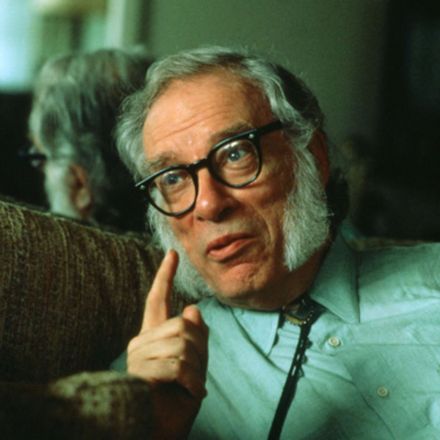

10 years ago
22
No, It’s Not Your Opinion. You’re Just Wrong
I have had so many conversations or email exchanges with students in the last few years wherein I anger them by indicating that simply saying, "This is my opinion" does not preclude a connected statement from being dead wrong. It still baffles me that some feel those four words somehow give them carte blanche to spout batshit oratory or prose. And it really scares me that some of those students think education that challenges their ideas is equivalent to an attack on their beliefs. -Mick Cullen
Continue Reading
Additional Contributions:



























Join the Discussion
Here's something I've never understood.
If it is your opinion -- and you freely admit it to be an OPINION -- why would you rage out attempting to defend or preserve that opinion?
An opinion is just a thing you think, based on the information you have, that you admit may or may not be true.
I adore discussing opinions and the differences between them, but I'm never going to lose my mind because something I voluntarily deem an opinion isn't being respected or agreed with, because by nature of calling it an "opinion," I'm admitting to the existence of a potential margin of error!
THAT'S THE PURPOSE OF THE WORD!
Otherwise -- if you're convinced your opinion is not wrong and could not be wrong -- you'd call it "truth"! (Even if what you deem "truth" is, in fact... not.)
A common human behavior I've noticed in myself and others is to conflate "what I think" with "what is true." For example when my ex-wife and I argued she would invariably claim "you just don't understand." I would then explain how I did understand but that I didn't agree and why. But she would fall back on her insistence that I really didn't understand. I eventually figured out that she couldn't conceive of the possibility that I could understand what she was thinking and not agree with her. She thought it, therefore it must necessarily be true.
Nor is this a new phenomenon. Daniel Patrick Moynihan famously wrote to Richard Nixon that everyone is entitled to his own opinion, but not to his own facts. Lately a popular thing to claim is that we have to respect everyone's beliefs, but I'm with Patton Oswalt when he replies, NO, YOU DON'T.
I've heard it said that the mark of a good skeptic is not when you debunk someone else's idea but when you successfully debunk your own.
I've observed this behavior before, but I was never able to think of it in such clear terms, to get to the root of it as you have here. This small-minded, self-assured thinking typically scares me. Whenever I encounter someone who cannot imagine that they may be even partially wrong, I start to judge that person as dangerous (whether or not that's the right thing to do, it's certainly what happens).
People who aren't able to question their own perceptions, who aren't able to be skeptical of themselves, are the ones who can rationalize and justify the most horrible, "means-to-an-end" actions. And when I see that behavior, alarm bells go off.
And this gets me into more mind boggling arguments than you can shake a stick at. You can believe in ghosts. Do I have to respect it? Nope.
But that's not an opinion though. That's a belief.
An opinion is a judgment that relies on facts.
e.g. I am against torture, because i. torture has been proven ineffective and ii. It's against international laws.
e.g. I do not like pickles. i. Tried them, it tasted awful.
A belief is something that is internalised as the truth, or close to, and need no support from anything.
e.g. I believe in ghosts
e.g. I think god exists
e.g. I'm pretty sure there's alien life somewhere
e.g. I'm sure it's delivery, not frozen.
So while you can have no respects for opinions or beliefs, only one of those can be really argued about. If you had proof that ghosts or god weren't real, that would be another ballpark. It doesn't mean it cannot be innacurate, or conceited, but since the lack of anything but internal logic makes a debate immensely complex, It's always best to leave beliefs alone.
Beliefs can be based on opinion rather than fact. Just because I believe gremlins are stealing my socks from the dryer doesn't mean my belief is true. So we can chalk this one up to the fuzziness of language. Opinion and belief can have some pretty heavy overlap depending on context.
What I learned says different. Beliefs and opinions are two sides of the same coin, so you can't base a belief on an opinion. What distinguishes beliefs and opinions are trust and commitment vs evidences and facts. A belief is something you commit to, trusts in. This does not preclude inaccuracy or inconsistency. Your beliefs can be wrong, but you have internalized the belief as truth. In logic, there's a whole branch dedicated to beliefs, called doxastic logic, which is quite fascinating to read about by the way. :)
Opinions are something born out of evidence. You've judged the situation based on facts, like when you choose the party you will vote for, the restaurant you will choose, your stance on television programs... You're informed, and that informed your decision. Of course, an opinion can be misinformed, or biased. If the facts are false, your opinion will be "wrong", but they are based on something. Another example would be vaccines. You can have a negative or positive outlook on the process, but your opinion of it is informed by something somewhere.
I do believe that you are correct in the fuzziness of the usage. People use both interchangeably, but when having a serious discussion, we should remember those are two concepts, that while linked, are not supposed to overlap.
oh, /u/gremlin is at his old tricks again? :P
Maybe I am up to my old tricks, maybe I might steal that other 10% of your diet.
Which I assume is poutine (which is a great after midnight snack I might add).
It pretty much is! :D
Your ex-wife doesn't sound like a nice person.
It's not all her fault. Her family has issues.
I'm trying to address this in my kids by letting them know that it's ok to be wrong, and it's ok to not know something. People have this idea that being wrong or ignorant about something is a bad thing, when it should be seen as the first step in learning something new. Like Jake says...
How long until the republicans draft a bill trying to make the ignorant a protected class?
People will defend opinions as if they're immutable facts. I think Gilligan's Island is the best television show in history. Come at me bro! (probably not the best example since that's obviously fact)
People will attack opinions as if they're lies and misinformation. I don't like soap operas.
You're so full of shit! Soap operas have been a mid-afternoon staple for nearly 75 years! Go back to troll land!
People will state opinion as fact. Obama is the worst president in history. That's just a scientific fact.
People will state (usually bullshit) "facts" as opinion. In my opinion, vaccinations are more dangerous than the diseases they protect against.
I agree with the sentiment, but this part seems a bit weird:
Should we really"confront" people for admitting they have favorite things?
"My favorite book is --"
"HAVE YOU READ ALL THE BOOKS?!"
I feel like the "-that I've seen" part of the sentence is useless because it's implied. For example, nobody would say "The Hobbit is my favorite book that I've never read". It makes no sense
I think you may be reading a little too much into that. David Tennant ranks up there with Tom Baker for me as the Doctor, but there have been thirteen actors total to have played the role in one capacity or another, two of whom only got to appear once or twice. People tell me they love Doctor Who and think Eccleston was the best Doctor, or Tennant or Smith or Capaldi and that's fine. But it's also valid to say "have you seen any of the others?" A lot of people don't know that Doctor Who was the longest-running science fiction series in television history before Christopher Eccleston starred in the reboot.
So I don't think the author is claiming that someone can't possibly prefer David Tennant as the Doctor. I think he's pointing out that having a favorite is an opinion, and that opinion may not be fully informed. So when someone expresses an opinion like that it's okay to point out that the world might be a little bigger than they realized.
At what point does the opinion become fully informed? When they've seen all the Doctors? When they've seen all the episodes? When they've read all the extended universe comic books?
Hypothetical Guy says David Tennent is their favorite -- not "the best", just a personal favorite. The author suggests this person should be confronted. And then, in a perfect would, the person would immediately amend it to, "The best I've seen."
The problem is, this "best I've seen" stuff goes for every opinion:
* X is my favorite horror movie, that I've seen.
* Y is my favorite food, but now that you've reminded me I have yet to eat all the foods, there might be other foods out there I prefer
* Y is my favorite vacation destination, though I fully admit I have yet to traverse every known location on Earth, and, in a future where space travel becomes affordable, my solar system.
Edit: I mean, in a polite conversation, maybe it just goes without saying that no one has ever experienced all their is to experience, and at this point we can't even agree on what being fully informed even means.
That's where I think you're reading too much into it. I didn't get that the author advocated confronting people over their opinions. I think he was trying to make the point that opinions are frequently made without all the facts. He's not arguing that someone who touts their favorite Doctor is wrong because they haven't seen all the Doctors. He's saying that making such a claim without knowing all of the choices is inherently self-limiting. It may not be the fault of the fan because they didn't know there were other doctors or because they didn't have the opportunity to view every single episode (plus three movies, soon to be four!). So there's nothing wrong with saying, "I'm glad you like David Tennant. Did you know that Tennant's favorite Doctor was Peter Davison, or that there were nine others before him?"
What the author is ranting about are people who then turn around and say, "I don't care about that! David Tennant was the only Doctor as far as I'm concerned!" In other words, people who treat their opinions as unassailable fact and that you're somehow wrong for either expressing a counter opinion or pointing out that there's more to the topic than they may have realized.
Er, is he? Because if that were the case, maybe he should have used that example in the article.
Then it wouldn't come off so much like:
Person 1: David Tennant is my favorite Doctor.
Person 2: Making such a claim without knowing all of the choices is inherently self-limiting!
Meh. Nobody's perfect. I'm still going back to essays I wrote decades ago and realizing I could have phrased something better. In this case I think the rest of the context is pretty clear about the author's point.
My problem with this is that, from my personal experience (which is like an opinion, sort of), the more people are sure of their opinion as fact the better they'll argue that opinion; or, at least, the more tightly they'll hold to that opinion. I've struggled for a long time with wanting to learn as much about my favorite subjects (history and literature, mainly) as I possibly can, only to encounter the common problem of gradually becoming less secure of what you know as you learn more, once you begin to realize the vast expanses of the subject that are completely unknown to you, while someone who has only scratched the surface may not realize there is more to the iceberg than just what lies above the water, so to speak.
What this means, and what I've encountered, is that, sadly, people with strongly-held opinions and beliefs tend to dominate the conversation, any conversation, particularly when it's online. In a medium when text is the only real option to convey an opinion, those who are secure in theirs and willing to defend it hardest almost always, in my experience, break down the opposition through sheer unshakable belief or simply attacking the other person who is not as secure in a belief they know is based on relatively little evidence.
It's a sad state of affairs, and scary as well when I see it spread from forums to larger sites and that same mentality starting to leak into real life.